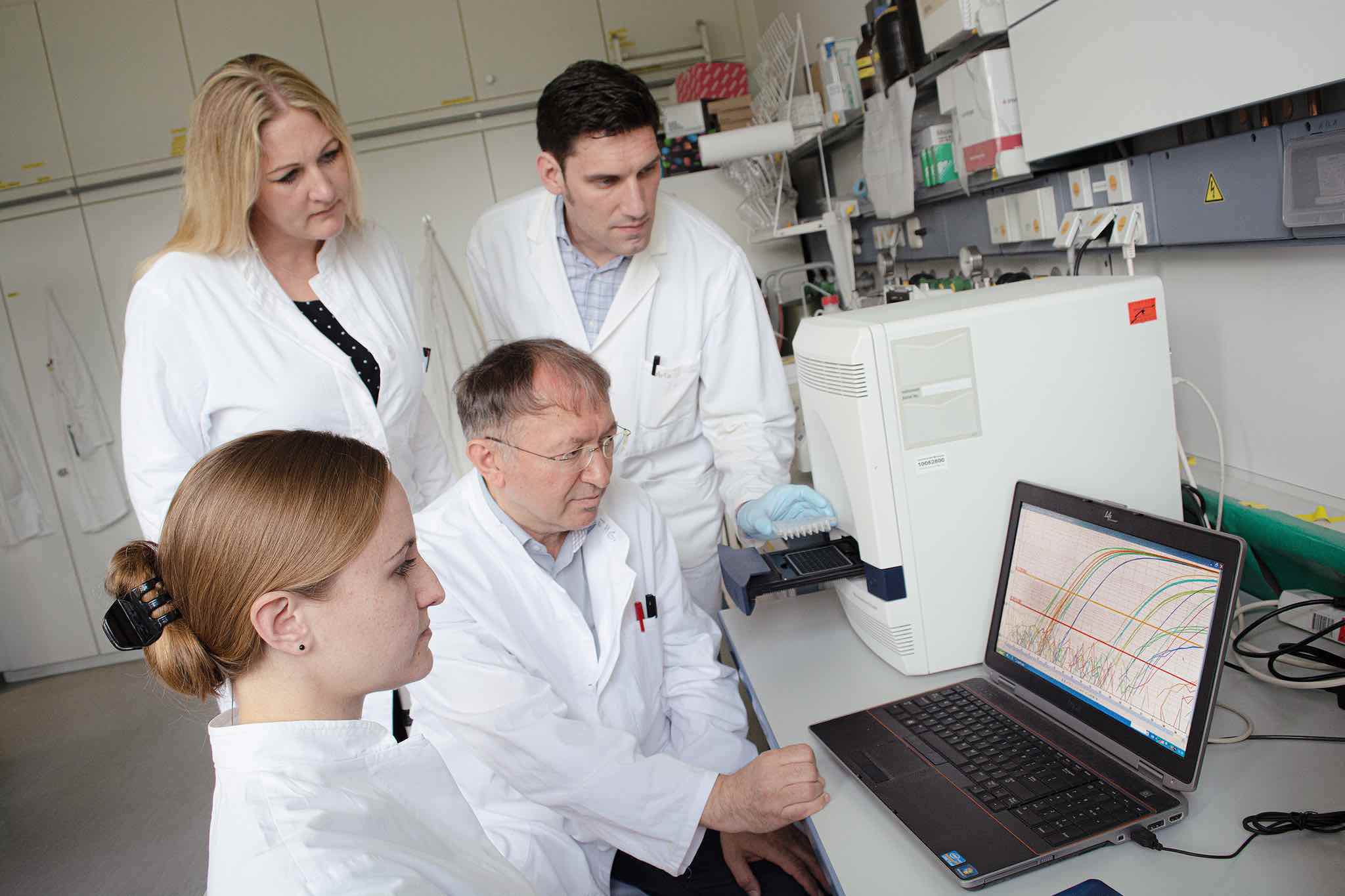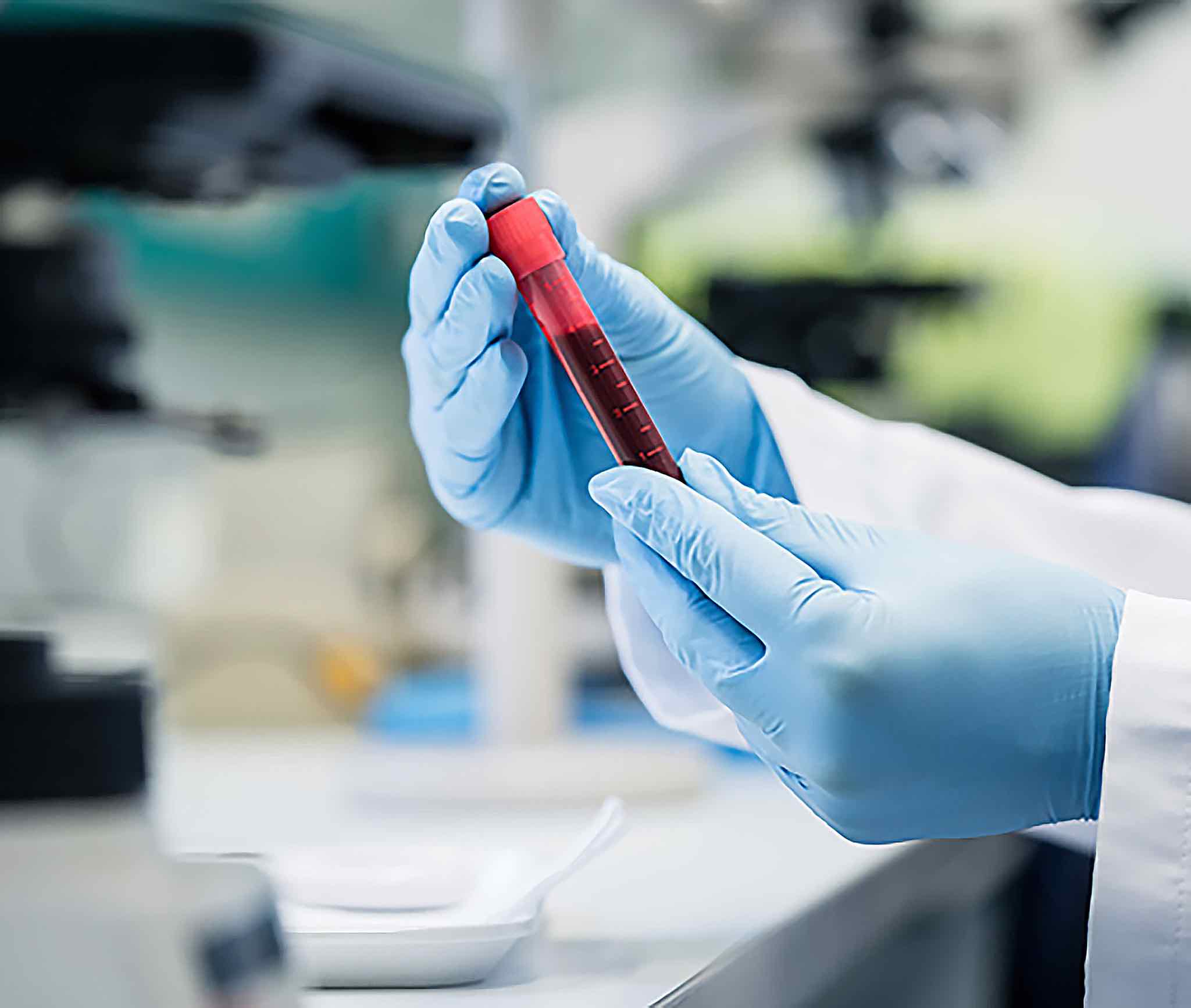
Tracking Down Testicular Cancer
How two graduates from the University of Bremen turn valuable research results into a marketable product with their start-up
You’ve studied, completed a doctorate, done successful research – now what? There was a day when Dr. Meike Spiekermann and Dr. Nina Winter also found themselves faced with this question. Spiekermann had collaborated on groundbreaking development in testicular cancer diagnostics and Dr. Winter had completed research and her doctorate in human genetics. As promising scientific results were ripe to be marketed, the two of them had the courage to start their own company: miRdetect.
During her studies in biology at the University of Bremen, Meike Spiekermann chose to major in human genetics. She wrote her diploma thesis and PhD dissertation under the supervision of PD Dr. Gazanfer Belge, one of the leading researchers in the area of testicular cancer – and thereby contributed to the first notable successes in this area (see text at bottom of page 53). “The response both from the clinical side as well as from the scientific community was incredible,” she tells us today. She continued with this topic. ‘MicroRNAs as biomarkers for patients with testicular germ cell tumors’ was the subject of her doctorate and a continued scientific path seemed to be mapped out. The crowning moment was a publication in “European Urology”, one of the major urological journals.
However, there is no automatism that ensures successful research will also lead to a promising scientific career. Nina Winter studied technical and applied biology at the Bremen University of Applied Sciences and then did her doctorate at the former Center of Human Genetics of the University of Bremen, however in quite a different subject area – tumor and prenatal diagnostics. Because she, like Meike Spiekermann, was faced with the question of what to do after completing the doctorate it was decided: “We are going to start our own company. The results of the biomarker research in the area of testicular cancer were so promising that we saw a market opportunity,” Nina Winter explains.
Malignant Tumor in Young Men
Around the world, urological clinics are waiting for a tool that can make both the detection as well as follow-up treatment of testicular cancer easier and safer. Testicular cancer is the most frequent malignant tumor found in men between 20 and 45 years of age. An important aid in assessing the progression of the disease is determining the concentration of biomarkers in the patient’s blood. However, reliable marker were unavailable to clinicians for a long time – now they are available thanks to research performed at the University of Bremen. The scientists involved have patented their work. “This was an important prerequisite for founding our company. We were advised by UniTransfer, the transfer point at the university. Being accompanied by InnoWi, the patent utilization agency of Bremen, was a big help. The EXIST Transfer of Research program, financed by the Federal Ministry of Economic Affairs and Energy, then helped us make the first steps possible – in essence the specific development of the business idea,” says Meike Spiekermann.
“Medical technology is a very big challenge for a start-up.” Dr. Nina Winter, managing director of miRdetect
miRdetect GmbH was then founded in May 2016, not only by the two biologists acting as managing directors, but also with the involvement of the research and user side of things. The company name refers to microRNA 371, the marker that detects testicular cancer. “It was not easy to get the funds together for the business start-up. But the idea and the product convinced additional investors – and also some of our relatives,” Nina Winter says with a smile.
Test Kit Will Soon Be Approved
The result of the work of miRdetect is a test kit that contains all the necessary reagents and should soon be sold to laboratories ‘ready-to-use’. “Several major customers in Germany are already emerging. The test is still in the approval process, however we will probably see it on the market by 2020,” says Meike Spiekermann. “Medical technology is a very big challenge for a start-up. The approval of medicines or products is a rocky road.” However, the fact that miRdetect came up amongst the top ten of 72 submitted business models in the Science 4Life Venture Cup in 2017 – a nationwide competition for the best business plans in the fields of Life Science, Chemistry, and Energy – shows that the start-up was considered to have great chances as a company by experts.
Whilst the bosses of miRdetect still shared their offices at the university and at the Bremen Innovation and Technology Center (BITZ) during the establishment of their company, they have now landed further north. “Despite a long search, there were no suitable facilities that met our needs in Bremen,” Nina Winter explains. They finally found what they were looking for in Bremerhaven: miRdetect has about 125 square meters of office and laboratory space available to them at the Bio Nord Biotechnology Center, which is also an environment that matches the work they are doing. And they are creating high quality jobs. For instance, Dr. Arlo Radtke, who conducted the most recent major research study with 37 European clinics together with PD Dr. Gazanfer Belge at the Faculty of Biology/Chemistry, was hired by miRdetect as soon as that work was completed. “Arlo Radtke brings the most up-to-date scientific know-how with him – and naturally the contacts to the clinics and laboratories that will possibly be part of our client base in the future”, says Meike Spiekermann.
Other Types of Cancer as a Long-Term Goal
In the long term, both managing directors plan to expand the tumor verification procedure from testicular cancer to other types of cancer as well. “It is a lot of work – however, we know that our method can also be applied to other biomarkers,” Nina Winter explains. “However, that is still a vision for the future. We are taking it one step at a time!”

Tumor Research at the Highest Level
The work group surrounding human geneticist PD Dr. Gazanfer Belge (Faculty of Biology/Chemistry) plays an important role internationally in the research of biomarkers for testicular cancer. In 2012, a biomarker was found that signified a major step forwards in the detection and follow-up treatment of testicular cancer. In a subsequent study lasting several years – financed by the Wilhelm Sander Foundation for cancer research with 170,000 euros – this biomarker was progressively further developed in cooperation with 37 European clinics.
The accuracy of the marker is verifiably so high that clinical application is in sight. The results of this study were published in one of the highest-ranking scientific journals in the world: the Journal of Clinical Oncology. Due to the spectacular success of the research performed at the University of Bremen, the German Cancer Aid (Deutsche Krebshilfe) has decided to finance another follow-up study with 183,000 euros. The German Association of Urology (DGU) awarded the Bremen study with the Maximilian Nitze Prize at the German Urologists Conference in September 2019 – the highest scientific award of this guild.